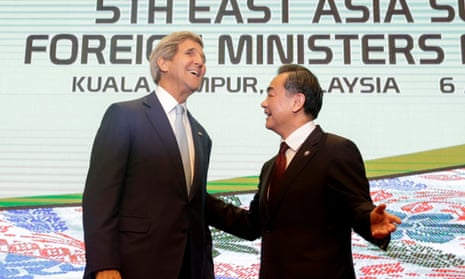China’s land reclamation in the South China Sea has “increased tensions” in the region, south-east Asian foreign ministers said at the close of talks dominated by Beijing’s island-building.
The declaration, contained in a final communique, followed a warning by US secretary of state John Kerry that Washington would not tolerate any restrictions on freedom of navigation in the strategically important waters.
The south-east Asian ministers’ joint final statement noted “the serious concerns expressed by some ministers on the land reclamations in the South China Sea”.
It said the land works “have eroded trust and confidence, increased tensions and may undermine peace, security and stability in the South China Sea” – but without specifically singling out Beijing.
The communique was hashed out after two days of wrangling over how hard to pressure China on its controversial drive to expand tiny reefs and build military posts in the disputed waters.
China claims most of the South China Sea, through which $5tn in ship-borne trade passes every year. The Philippines, Vietnam, Malaysia, Taiwan and Brunei also have overlapping claims.
In a statement released just before midnight on Thursday, China’s foreign ministry accused the Philippines foreign minister of teaming up with his Japanese counterpart to “attack” China’s South China Sea policy.
“First off, the situation in the South China Sea is generally stable, and there is no possibility of a major clash,” the statement cited Chinese foreign minister Wang Yi as telling the forum, which was attended by foreign ministers from around the region.
“China opposes any non-constructive words and acts which widen division, exaggerate antagonism or create tensions.”
The issue took centre stage at the series of diplomatic meetings this week in Kuala Lumpur, hosted by the 10-nation Association of South-east Asian Nations (Asean). They also included envoys from two dozen other nations such as China and the United States.
A day after voicing concern to his Chinese counterpart Wang Yi over the potential “militarisation” of the South China Sea, Kerry said freedom of navigation must be maintained.
“Let me be clear: the United States will not accept restrictions on freedom of navigation and overflight, or other lawful uses of the sea,” he told reporters.
Diplomatic sources said the Philippines and Vietnam – which have been in the most direct confrontation with China – had called for strong language.
But they said there had been pushback from Beijing’s traditional allies among the association. Cambodia, Laos and Myanmar traditionally side with China within Asean.
Wang told the forum that China is the real victim in the South China Sea, pointing to what he said was the “occupation” of some of its islands there, including by the Philippines. “But to maintain and protect the peace and stability of the South China Sea, we have maintained huge restraint,” he added.
He said Japan had built up a remote island in the Pacific called Okinotori to enforce Japanese territorial claims. China has previously refused to recognise Tokyo’s claims to an exclusive economic zone around Okinotori, which lies about halfway between Guam and Taiwan, 1,700km (1,050 miles) from Tokyo. “Before criticising others, Japan must first take a good look at its own words and behaviour,” Wang said.
The United States and south-east Asian nations have called for a halt to further island-expansion and construction by China. Wang, however, said Wednesday that land reclamation had “already stopped” – a claim some diplomats said was met with scepticism at the gathering.
Kerry told reporters after the close of the talks: “The Chinese have indicated that they have stopped. I hope it is true. I don’t know yet.”
Reuters and Agence France-Presse contributed to this report.

Comments (…)
Sign in or create your Guardian account to join the discussion